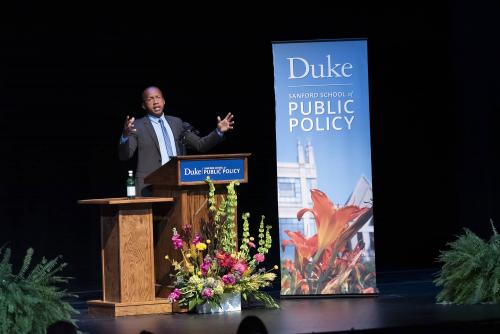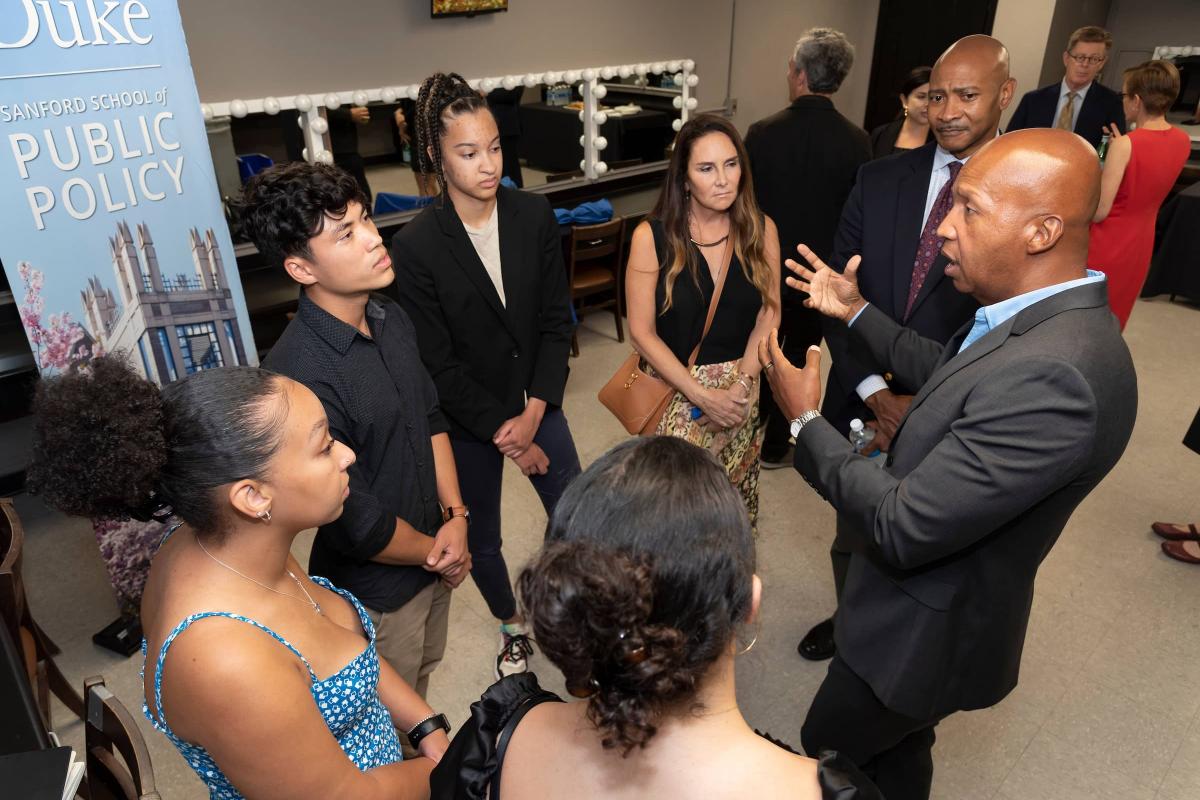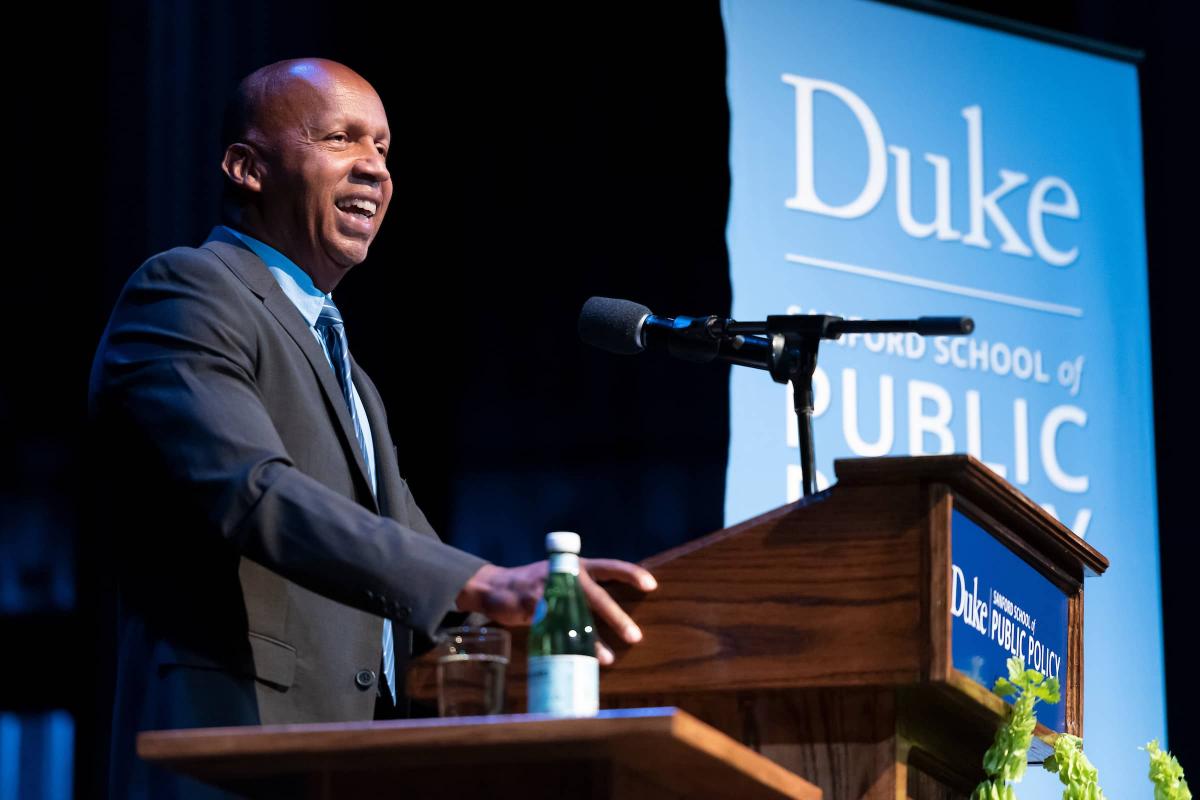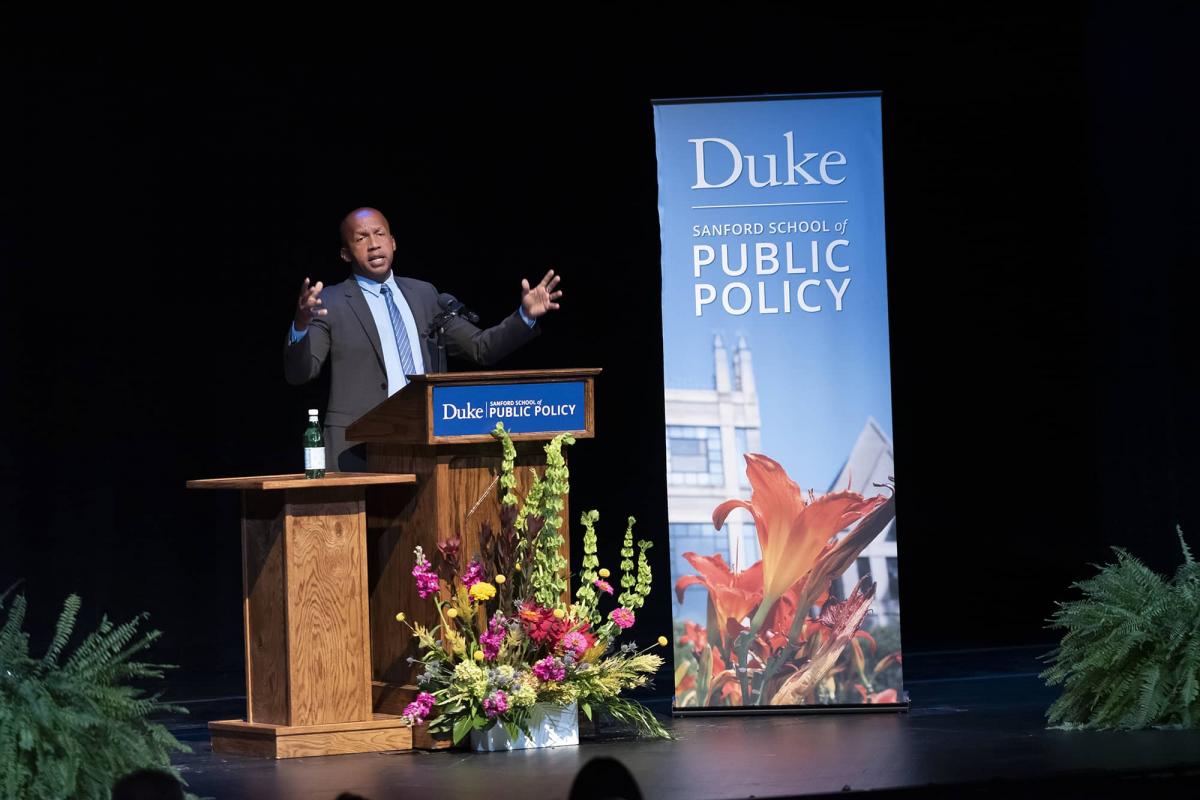By Ahliyah Sanford MPP'23
America is a nation of opportunity that’s grounded in virtuousness and built on equality – if you’re White. This is no unintended caveat. Black and Brown communities have had to fight for every opportunity and work twice as hard, but it still isn’t enough. Instead of being recognized as human beings with rights, we have been criminalized, terrorized, brutalized and ostracized.
How did we get here? How did we become a nation that harms and neglects our most vulnerable populations? Renowned human rights lawyer and author Bryan Stevenson eloquently described our nation as neglectful – one that would rather ignore its past because accepting it is uncomfortable and inconvenient. When our nation fails to acknowledge the truth of our bloodied past, Black and Brown communities are forced to bear with the violent consequences.
This was the insight Bryan Stevenson, founder and Executive Director of the Equal Justice Initiative, offered on September 22 during his Terry Sanford Distinguished Lecture Standing For Equal Justice.
As the author of critically acclaimed New York Times bestseller, Just Mercy, Bryan Stevenson expertly weaved powerful personal and historical insight about the priorities of our nation to answer the question Americans have struggled with for centuries: How do we reckon with our past?
As a Black woman who suffered in one of our nation��’s failed social institutions, I found myself on the brink of tears several times during his lecture. Growing up watching family and community members be criminalized and demonized, I could not understand why this was happening. Why were we targeted? Why are we impoverished? Why is our pain ignored? How did we get here?
Stevenson’s insight demonstrated that our nation’s failure to properly address our history of genocide and enslavement allowed for pervasive narratives rooted in fear and racism to flourish. As a result, White supremacy became imbedded in American society, addiction was criminalized, Black families were uprooted, and children were deemed “super predators.” Our nation’s identity has less to do with freedom and more to do with punishment.
Mass Incarceration
As a nation, we went from housing approximately 250,000 justice-involved individuals to housing over 2.5 million – the largest justice-involved population in the world. Consequently, women are being incarcerated at unprecedented rates, families are broken, and generations of predominately Black and Brown youth are irrevocably harmed. How did we get here? Stevenson posits that narratives, proximity, fear and anger gave rise to an overly racialized and punitive American society that targets at-risk populations.
Stevenson explicates that narratives around race were created to justify the Native American genocide and enslavement of Black Americans. White Protestant Christians could not go against their religion and harm other human beings. But, they could brutalize, terrorize and murder “savages.” To justify their horrendous actions, White Americans de-humanized Native and Black Americans to pillage their resources and exploit them. In doing so, White Americans eradicated rich communities and cultures. These actions gave rise to White supremacy and the narrative that “Black people are not as good as White people.��” A narrative America has failed to extinguish.
“The North might have won the Civil War,” Stevenson argued. “But the South won the narrative war.”
After emancipation, Black Americans committed themselves to democracy and justice. We opened businesses and registered to vote, but it still wasn’t good enough. Why? The answer is fear.
White America feared Black America because false narratives and racist ideologies prevented the truth from being seen. The lack of proximity from one another prevented White America from witnessing the acts of violence Black America was subjected to. Anger prevented White America from the voice of reason. To them, Black America is “dangerous” and “guilty."
White America allowed fear and anger to formulate violent and targeted policies, such as Jim Crow laws. These policies criminalized race, poverty, and mental health. As a result, we have a system of mass incarceration that targets vulnerable populations – especially children.
We don’t have children anymore. We have “super predators.” Now, our injustice system can place children in adult jails or prisons. There are 13 states that have no minimum age to try a child. Consequently, approximately 250,000 youth are tried, sentenced, or incarcerated as adults every year – the vast majority are Black and Brown. We have allowed fear and anger to ruin lives. Where do we go from here?

The Road to Redemption
Stevenson provides a number of solutions to reconcile with our past:
- WE must accept and acknowledge our past.
- WE must create an American identity rooted in kindness and empathy.
- WE must change the harmful narratives surrounding race and ethnicity.
- WE must commit to having conversations to change racial narratives.
- WE must create a landscape that speaks truth to ignorance.
- WE must be OK with doing uncomfortable and inconvenient things.
- WE must remain in close proximity to those in need.
- WE must continue to stay hopeful.
Prior to the event, I felt tired. I am weathered after years of experiencing racism and bigotry. I was tired of hearing about the injustices happening in my community. I felt like it was never-ending. I was becoming jaded and detached. Listening to Stevenson’s lecture and watching him present these solutions so passionately lit a fire in my belly. For the first time in months, I felt hope again.
Ahliyah Sanford is a second-year Master of Public Policy candidate studying social policy. She is passionate about understanding how mental health and poverty affect criminogenic and education outcomes – with a focus on race and ethnicity. While at Duke, she led DEI and mental health initiatives to recruit and retain students of color as a graduate research assistant. Currently, she is running a guaranteed income pilot in Durham for formerly justice-involved individuals.
Another Student Perspective
Charlotte Kramon PPS'24 also attended the Stevenson event. She writes that she is passionate about racial inequity for a personal reason. Her best friend was from a poor neighborhood in Los Angeles. "She would tell [me] about the days when she was homeless or about her friends who had been shot," Kramon writes. "Her stories exposed how far this country has set Black people back."




